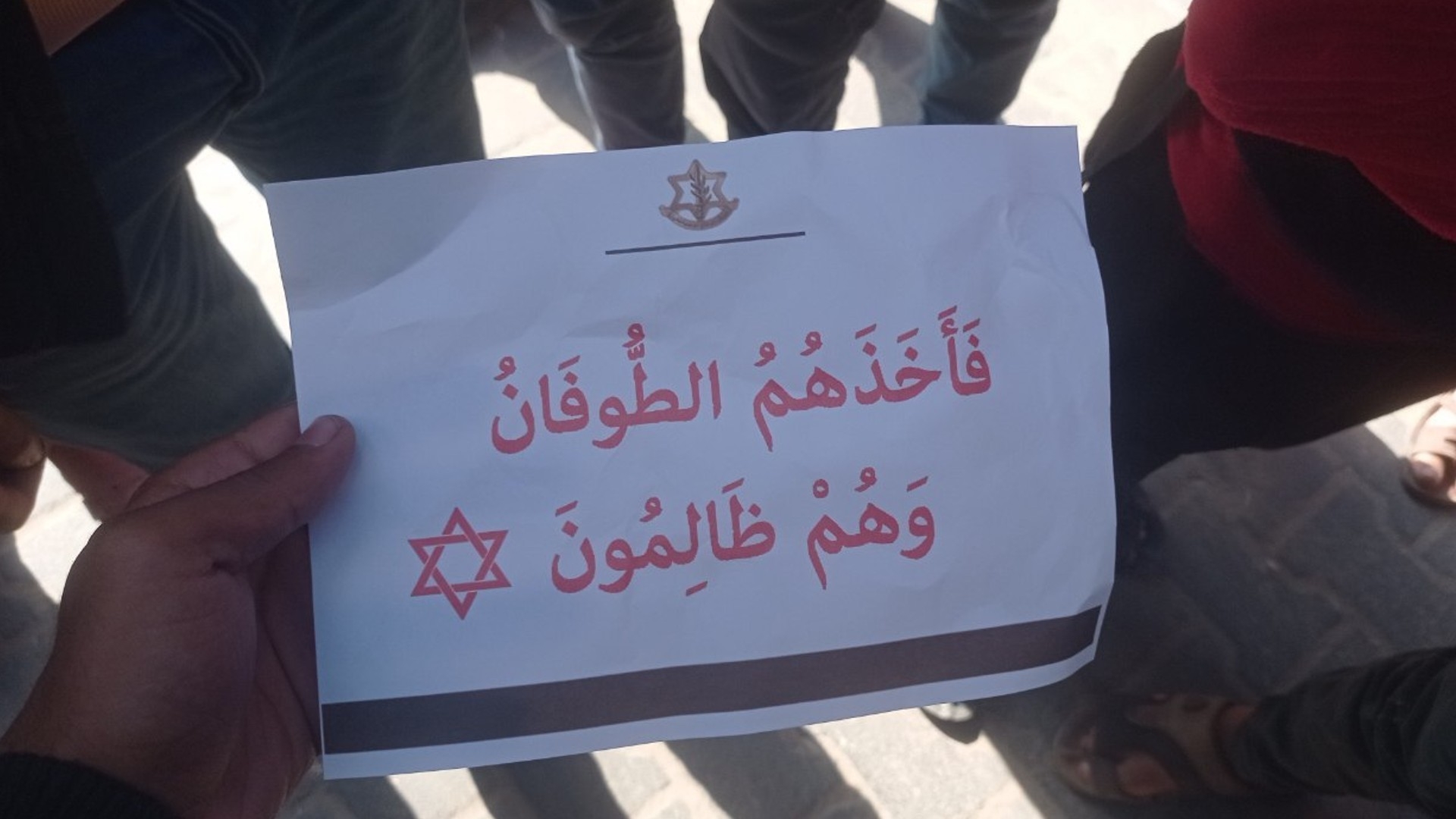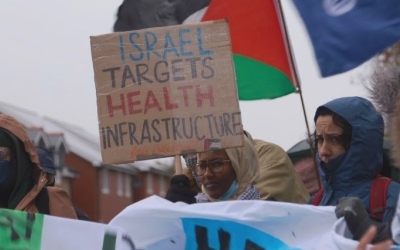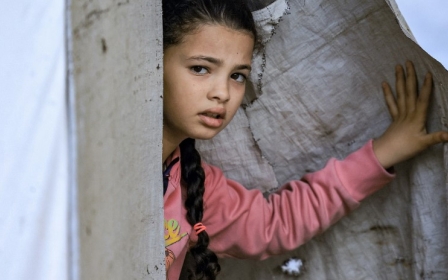Israel-Palestine war: Israel drops leaflets in Gaza with Quran verse warning of 'floods'

Israel's military dropped leaflets over southern Gaza on Wednesday with a Quranic verse warning about "flooding overtaking wrongdoers".
Video footage taken in the city of Khan Younis showed thousands of pieces of paper being dropped from the sky by Israeli warplanes.
Printed on them was a verse from the Quran, which reads: "The flood overtook them, while they persisted in wrongdoing".
The text, which appeared next to a Star of David symbol and Israeli army logo, refers to the story of the Prophet Nuh, known as Noah in the Bible. In both holy texts, God punishes wrongdoers with a flood that covers the whole world.
Such use of the Quran by Israelis has angered both Palestinians within Gaza and Muslims further afield.
New MEE newsletter: Jerusalem Dispatch
Sign up to get the latest insights and analysis on Israel-Palestine, alongside Turkey Unpacked and other MEE newsletters
Holding up the flyer to a camera, Um Shadi Abu el-Tarabeesh, who was displaced from northern Gaza, said: "[Israel] are the wrongdoers, not us. They are the ones harming civilians, innocent citizens and defenceless children.
"We have no weapons, we are not terrorists, and we are not doing anything bad," she added. "What is the purpose of these words?"
Social media users speculated whether the reference to flooding alluded to Israel's plan to flood tunnel networks in the Gaza Strip with huge amounts of seawater.
In November, Israel finished assembling at least five large seawater pumps a mile north of al-Shati refugee camp in northern Gaza, according to a report in the Wall Street Journal.
The pumps can draw water from the Mediterranean Sea and move thousands of cubic metres per hour, giving Israel the ability to flood Gaza's tunnel network within weeks, the report stated.
US officials said that Washington was informed of the plans, and was weighing up the feasibility, the environmental impact and the military value of disabling the tunnel network.
Analysts have warned that flooding tunnels would have an adverse impact on Gaza's soil and exacerbate the humanitarian crisis faced by Palestinians.
Israel has not yet decided whether it will move ahead with the plan.
Middle East Eye has reached out to Israel's military, to ask what the rationale was behind the leaflet drop on Khan Younis, but had not received a response at the time of publication.
Past use of the Quran
It's not the first time Israeli officials have used the Quran to seemingly justify their actions during an assault on the Gaza Strip.
During its bombardment of Gaza in May 2021, Israel's official Arabic language account on X, formerly Twitter, posted verses from the chapter (or surah) known as "the elephant", alongside a photo of a plume of smoke rising out of a building after an Israeli air strike.

In Islamic tradition, Surah al-Fil (the elephant) describes an ancient and pre-Islamic episode in Arabia where an army made up of war elephants marches on the holy city of Mecca, only to be defeated by flocks of birds, which drop stones on the advancing army.
In a follow-up post in the same Twitter thread, the account says: "This is a reminder of God’s ability to support those who are righteous over falsehood, especially since Hamas is the arm of Iran that seeks to ignite the region. The IDF targets Hamas terrorist targets in Gaza."
It appeared that Israel's military was comparing itself to the birds, which in the Quranic account rescued Mecca from the war elephants, which in this case alluded to Hamas.
More than 16,000 Palestinians in Gaza have been killed by Israeli attacks since the war began two months ago. Most of the dead are women and children.
The bombing campaign followed Hamas's attack on southern Israeli communities on 7 October, which killed around 1,200 Israelis.
Israeli forces have launched a devastating assault on Khan Younis since Monday evening, with its tanks entering the area for the first time since the war began.
Israel has ordered Palestinians in the city to move to other parts of southern Gaza, but the UN has warned that nowhere is safe for Palestinians in the besieged enclave.
This article is available in French on Middle East Eye French edition.
Middle East Eye delivers independent and unrivalled coverage and analysis of the Middle East, North Africa and beyond. To learn more about republishing this content and the associated fees, please fill out this form. More about MEE can be found here.




